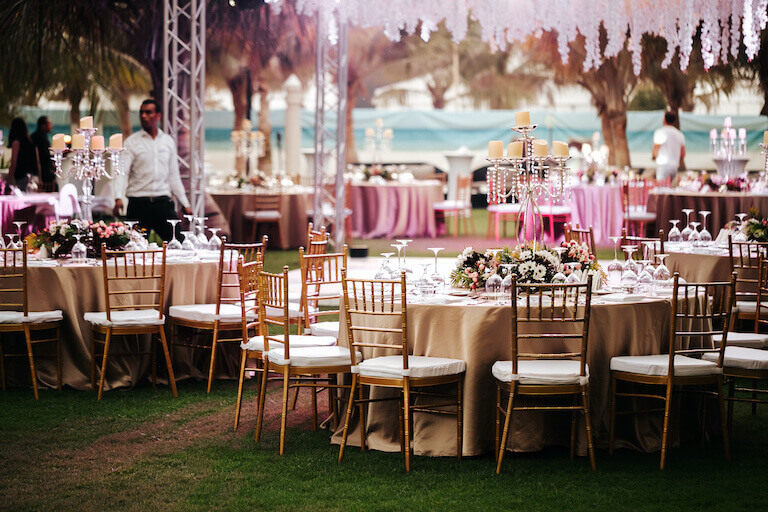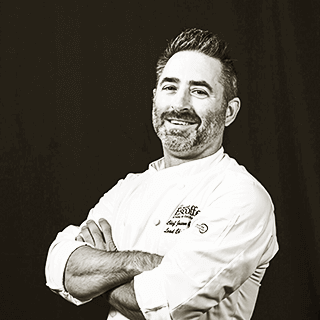Does complexity excite you? Does the thought of spending weeks sourcing the exact cutlery to satisfy your client’s request for “the same forks they had on the Titanic” make you feel alive? Can you keep track of big-picture concepts and minute details at the same time?
And—perhaps most importantly—do you love creating positive experiences for other people?
If so, you may be cut out for a career in event planning.
Event planners turn mountains of logistical details into seamless, memorable events in a wide variety of contexts, from major sporting or corporate events to weddings and private parties.
But what does it take to break into this career? Let’s take a closer look at how to become an event planner, including some key steps you might take toward landing a job and some important attributes that could help you thrive in this exciting field.
What Does an Event Planner Do? Everything—and Then Some
The glitz and glamor of a Hollywood premiere. The thrill and excitement of a tech company’s product launch. The elegance of a charity event for a great cause.
These events don’t just happen on their own. When they come together, it’s thanks to the meticulous preparation of event planners, the people responsible for coordinating the details and facilitating the execution of special events, from corporate seminars and trade shows to product launches and award ceremonies—any type of large, complex event that requires careful planning ahead of time to ensure it goes off without a hitch.

Event planners are generally responsible for planning every last detail of complex events.
But while the events themselves can sometimes be exciting, the vast majority of an event planner’s job is focused on the months (or even years) of planning that come before it. During this time, event planners are busy meeting with clients, building budgets, sourcing staff and vendors, and negotiating contracts—in short, ironing out every last logistical detail involved in pulling off an event.
Event planners may work in-house, coordinating events for their direct employer—like a law firm, corporation, or university—or they may work for an agency that specializes in planning events for their clients.
The job is largely administrative, a function that extends up to the day of the event. While the event planner may be present at the event, they’ll likely spend most of their time behind the scenes, managing the proceedings to ensure they go off according to the plan that they painstakingly constructed.
That said, this job can come with the potential for unique, unforgettable experiences one may not be able to find in other careers—like traveling to exciting places, staying in luxurious hotels, and meeting notable people. Occasional experiences like these can be thrilling punctuation marks to the long periods of diligent planning that make up the majority of this job.

Event planning involves extensive planning ahead of each big event.
How You Can Become an Event Planner
The path toward becoming an event planner is perhaps even more indirect than it is for other roles in the hospitality industry; people aspiring to this position may actually find more success seeking experience in tangential fields first—like restaurant or hotel management—before seeking out a job in the event planning industry.
With that said, here are a few key steps you may consider taking as you pursue your dream of working in event planning.
1. Choose a Path to Suit Your Passion
Before you begin, it may be valuable to take a step back and consider which type of event planning corresponds to your skills and interests. There are many niches and specializations within this industry; aligning yourself with a particular type of event planning can help you clarify what you may need to do to get there.
- Corporate event planning, which could include things like meetings, seminars, conferences, trade shows, and so on.
- Special event planning, which could include anything from weddings, parties, and film premieres to charity fundraisers, political events, and public celebrations.
For example, if you value creativity and variety, working in special events may give you more of an opportunity to let those aspects of your personality shine; if you prefer diving deep into details and logistics without getting bogged down by creative flourishes, corporate event planning may be more your speed.

Event planners may work in a variety of settings, from corporate meetings to weddings.
Corporate and special event planners can have very different professional lives, depending a lot on their areas of concentration. If a corporate planner focuses on events for a specific industry, many of their events may be limited to that industry’s prime locations (think Silicon Valley for tech companies). If a special event planner focuses on weddings, they’ll likely be busier in the first half of the year while finishing preparations for peak wedding season. These are just examples, however, and many event planners won’t limit themselves to one niche or another.
The specialty you choose now doesn’t have to be a permanent decision—but getting a sense of your options and setting a target can help give you direction as you start out along this career path.
2. Seek an Education to Elevate Your Skills
Generally speaking, there is no standard degree or certification necessary to enter this industry—but that’s not to say that an education shouldn’t play a role in your strategy. In fact, it has the potential to be extremely valuable, and in more ways than one.
For one thing, an education could provide you with meaningful skills that can serve you for years to come, no matter where your career takes you. Pursuing a degree in a program like Escoffier’s Hospitality & Restaurant Operations Management can expose you to catering and event operations techniques, hospitality management skills, and other foundational knowledge that you may be able to apply as an event planner.
An education can also potentially make you a more attractive candidate when seeking out jobs that could help you get relevant experience prior to entering the event planning industry. As we’ll discuss in a moment, it can sometimes be more effective to pursue job opportunities in other fields before applying for event planning jobs. Having a well-rounded culinary education under your belt can be an asset when seeking out those opportunities.
Finally, pursuing an education—particularly one that focuses on hospitality—can help you start networking, which is an essential part of launching a career in event planning. At Escoffier, you can have the opportunity to work with seasoned Chef Instructors with years in the culinary and hospitality industries behind them; you also have the chance to participate in an industry externship, where you can get hands-on experience and start making real-world connections.
3. Get Experience to Hone Your Craft
The event planning industry is competitive, and even entry-level and unpaid positions can be difficult to obtain. So, how can someone who doesn’t have experience in the industry yet break into it?
Getting relevant experience in other fields can be a great approach. When you ultimately do wind up applying for event industry jobs, potential employers may be be impressed by a resume that shows you have skills and experience in the industry; the exact position you held when you demonstrated those skills and got that experience is less important.

Aspiring event planners can acquire potentially relevant experience in other fields.
Consider some of the things that might be important to an event planner: managing complex operations, overseeing staff, negotiating contracts, and so on. Depending on the type of event planning niche you ultimately want to wind up in, you may be able to identify some additional skills that could be relevant—for example, if you want to work as a wedding planner, menu design could be a valuable skill.
Once you have an understanding of the skills that a potential employer may be looking for, you can pursue employment in fields that may be able to help you build out your resume. Possibilities may include:
- Restaurant management
- Hotel management
- Catering
- Project management
- Working at a venue, like a concert hall or event space
- Working in sometimes overlooked hospitality settings, like hospitals, nursing homes, or schools
You can also gain experience outside of a work context. For example, you could volunteer to help out with charity or student events—these opportunities may be unpaid and short-term, but they can still matter when acquiring early experience. Even planning events for family and friends can be meaningful experiences that you can draw on later.
In short, when getting ready to break into the industry, any type of experience that demonstrates a relevant skill set and a commitment to growth can potentially make you a more appealing candidate.
4. Make an Impression to Set Yourself Apart
Acquiring experience is one thing—but how can you present your experience to prospective employers in a way that will make a meaningful impression?
One of the first things you may want to attend to is building a solid portfolio. Try to document any and every event you are involved with as you are gaining experience. Even if the event seems ‘insignificant’ in the context of the broader industry—like a student event you volunteered for, or a graduation party you planned for a friend—being able to show off your work can make your skill set more tangible.
You may want to consider hosting your portfolio online; an attractive, well-designed website displaying your work can be a useful calling card and can make a great first impression.
From the outside, any industry can seem forbidding and difficult to break into. But networking can be a powerful tool for making connections, building meaningful relationships, and advancing your career. Cultivate the network you’ve started to build as you’ve been gaining experience—and, if you chose to pursue an education in hospitality, don’t forget about the friends, instructors, and other professional contacts you made there.
Beyond that, consider attending industry events, seminars, and workshops—these can be a great way to make connections with people in the industry and possibly even get job referrals.

Networking with fellow professionals can be a great way to build connections—and possibly discover new opportunities.
When you do land an interview, you may want to think about the conversation from the interviewer’s perspective. What are they likely to think is important?
Event planning is a dynamic and diverse industry that encompasses many different specializations, and even within a specialized niche you’re still likely to work on a wide variety of events for many different types of clients. So in addition to noting your specific achievements, you may also want to highlight your passion for the industry and the broad applicability of your fundamental skills.
This can show that you are versatile and have an understanding of the complexity and variety of the industry—which can be a great impression to make.
Do You Have the Qualities of a Great Event Planner?
Aside from whatever professional experience you have, certain core attributes may prove valuable in this career. Do these qualities sound like you?
Sharp Attention to Detail
Event planning is a fundamentally administrative profession; as such, it generally requires acute attention to detail. Whether they’re creating budgets, reviewing contracts, compiling risk assessments, obtaining permits, crafting spreadsheets, or designing minute-by-minute schedules, an event planner’s organizational skills are what turn mountains of complex information into a flawless, memorable event.

Careful budgeting and attention to detail can be essential skills for an event planner.
Creative Problem-Solving
Creating great events isn’t just a matter of signing contracts and managing spreadsheets. It typically also requires a strong knack for creative problem solving. Event planners may be confronted with constrained resources, difficult or unusual client requests, or abrupt changes to timelines or other expectations; it can take a positive, solution-oriented mindset to navigate these hurdles. Beyond that, even with months of careful planning, events themselves are unpredictable and don’t always unfold as expected; event planners will ideally be able to think on their feet when problems arise in order to keep things moving smoothly.
Fluid Communication
Event planning involves countless participants—the clients, the agency, staff, vendors, guests, performers, VIPs, and more. With so many relationships to manage, great communication skills can be another important attribute for someone in this position. An event planner is also likely to be responsible for negotiations with venues, vendors, and other stakeholders, making tactful communication still more important to this role.
Ready to Take the Next Step in Your Event Planning Career?
Event planning can be an exciting career for someone who loves to solve problems and create great experiences for others. There are many specializations to choose from within the industry—and many paths one may take to get there.
A well-rounded education that includes exposure to basic cooking techniques as well as the business skills involved in event management could make you a more compelling candidate when approaching employers and could allow you to bring a more culinary-inspired approach to your work.
If you want to make a culinary education part of your path, financial aid, grants, and scholarships are available to those who apply and qualify—which can help bring this opportunity that much closer to becoming a reality.
INTERESTED IN LEARNING MORE ABOUT HOSPITALITY CAREERS? CHECK OUT THESE ARTICLES NEXT!
- Careers a Hospitality & Restaurant Operations Management Degree Can Prepare You For
- 7 Reasons Hotel Management Could Be a Good Career Option For You
- What Skills Do You Need for a Career in Hospitality and Tourism?
*Information may not reflect every student’s experience. Results and outcomes may be based on several factors, such as geographical region or previous experience.
This article was originally published on January 28, 2023 and has since been updated.


